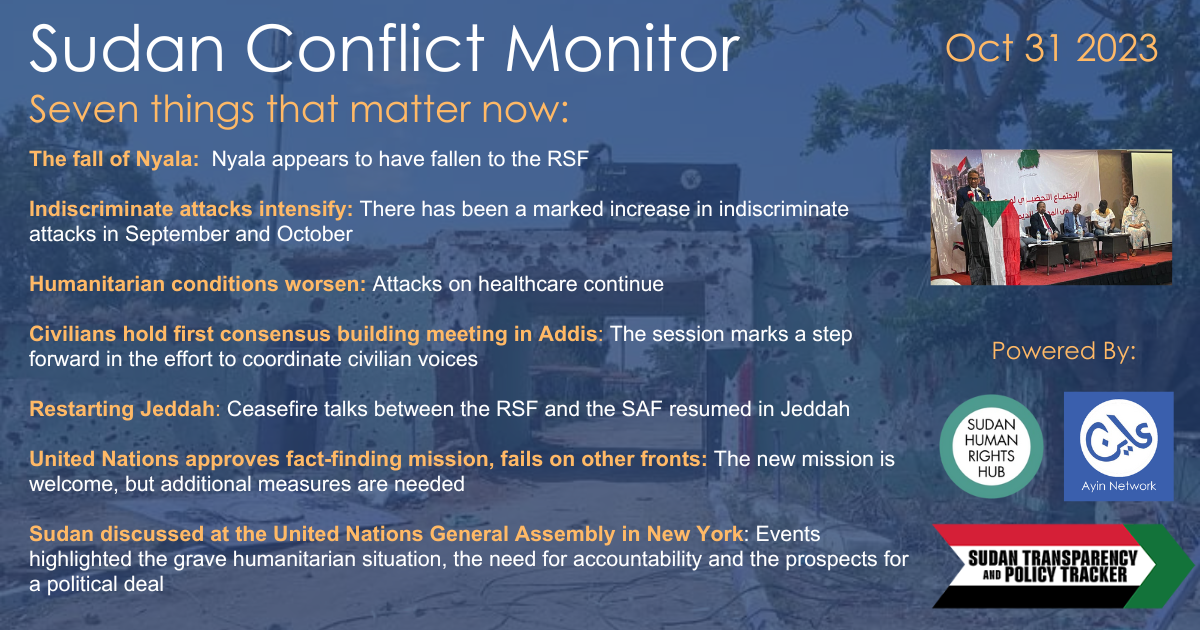31 October 2023
The Sudan Conflict Monitor is a rapid response to the expanding war in Sudan written through a peace-building, human rights, and justice lens. Here we have tried to capture the five most important stories in Sudan. Please share it widely.
Powered by Ayin Media, Human Rights Hub, and the Sudan Transparency and Policy Tracker
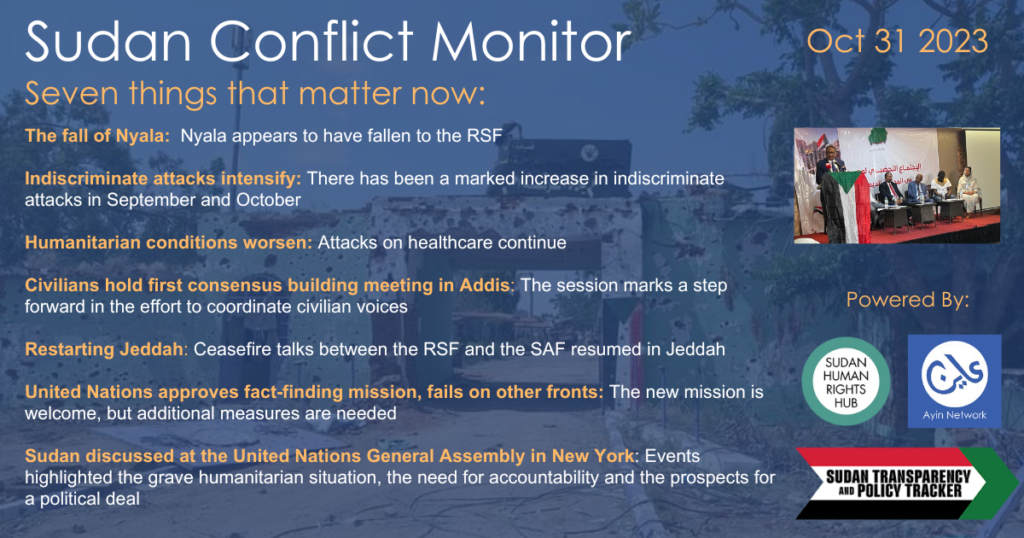
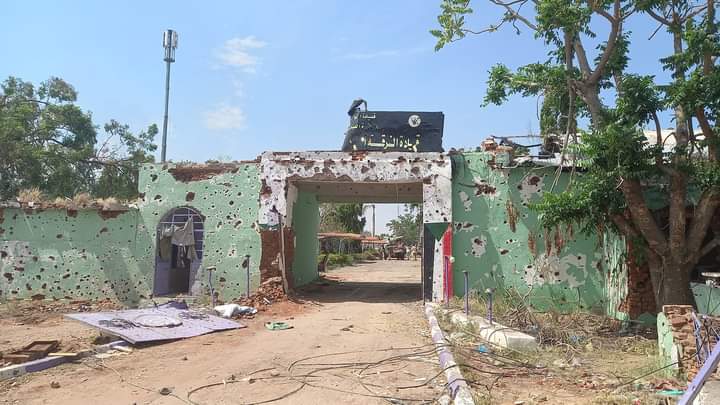
1. The fall of Nyala
Sudan War Monitor reported that the 16th division headquarters in Nyala were overwhelmed on the morning of October 26th, indicating that the city had fallen to the RSF. This followed days of fighting that Radio Dabanga reported started on Monday. RSF published a video in Arabic featuring its second in command, Abdelrahman Dagalo indicating that he was leading the effort and appearing to be in firm control of the city. Addressing reporters in Nyala, Dagalo also reportedly called on the displaced to return to Nyala. A network blackout has made these reports hard to verify and there have been some contradictory reports of SAF advances. However, on Saturday, the Sudan Tribune reported that a military source said that they had been forced to withdraw due to a lack of critical supplies.
The call for civilians to return to their homes and businesses, and the commitment to open and protect markets, together with the earlier resumption in RSF-controlled areas in Omdurman of some police and court functions and reopening of markets, appear to be a conscious effort by the RSF to present itself as a legitimate governing authority. This development increased alarm about the possible emergence of two governments in Sudan in areas controlled by the SAF and the RSF. The commanding appearance of Dagalo in Nyala, who has been sanctioned by the United States, maybe a conscious effort to rehabilitate his image.
This may also be an attempt by the RSF to improve their situation on the ground in the run-up to the resumption of talks in Jeddah. Nyala is an important prize because it is one of Sudan’s largest commercial agricultural and livestock trading hubs, and an important route for importing and exporting goods to South Sudan and the Central African Republic and through them, further afield.
There is also concern that the fall of Nyala might increase pressure on El Fashir and Zalingei, which host significant displaced populations. In Zalingei, displaced populations have been trapped in displacement camps for nearly a month, suffering severe shortages of food and water. In El Fashir, sources reported that the RSF fighters unleashed a violent rampage on the day Nyala fell to their forces, leading to clashes with the SAF and forces of the armed movements which have remained neutral in the confrontations until now, raising concerns that the armed movements might be drawn in the war. At least 130 IDPs have been killed in Central Darfur since the start of the conflict. If RSF were to gain control of both cities, then this would undoubtedly further increase their standing in the upcoming renewed Jeddah talks.
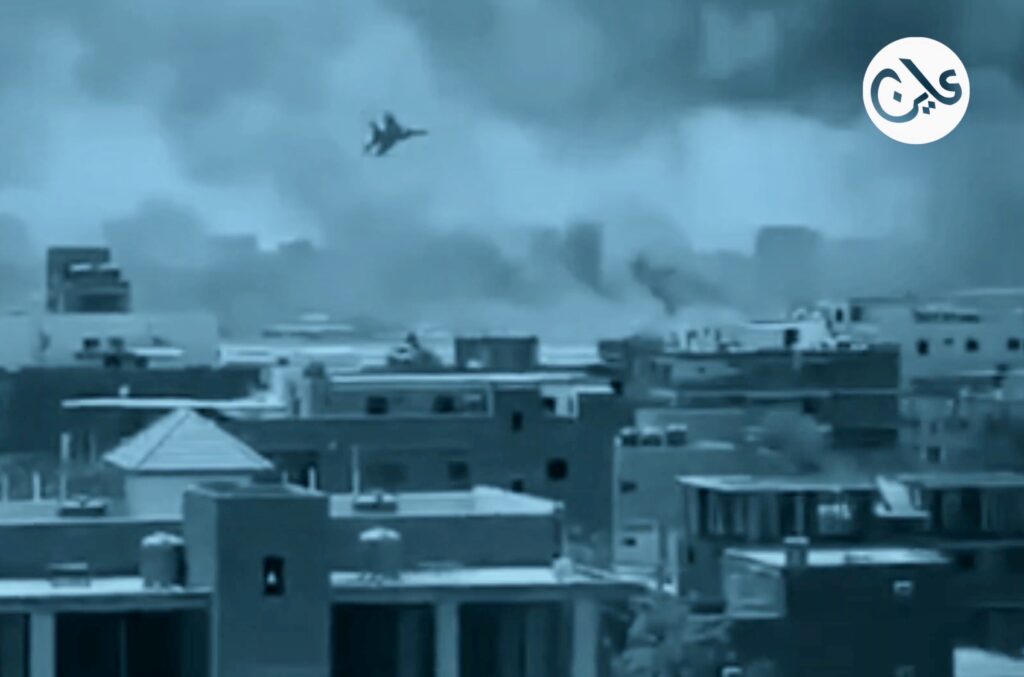 2. Indiscriminate attacks intensify
2. Indiscriminate attacks intensify
Since September, the warring parties have increased indiscriminate bombing and shelling of residential areas within the country according to the Sudan Conflict Observatory, a research initiative that monitors the conflict in Sudan using satellite data. The majority of the attacks were apparently by SAF but RSF’s use of anti-aircraft missiles has also contributed to some of the highest civilian death rates since the outbreak of war.
Ayin reported on previous indiscriminate bombing by both sides, with the armed forces using explosives in crowded areas and not distinguishing between combatants and civilians. In the first two weeks of September, over 150 civilians were killed by indiscriminate air strikes the Observatory found. Starting on September 2, SAF bombed four markets in the capital area: Kalakla, Al-Haj Youssif, Goro in Hai Mayo, and Hillat Koko, killing over 100 people. “All the armed groups were off the streets, the only thing hit by the bombs were local residents – traders and tea ladies,” said Mohamed Yasin, a resident of Hai Mayo and witness to the attack on Goro Market.
On September 13, SAF targeted markets in Sudan’s second-largest city, Nyala, killing at least 40 people and injuring countless more. Airstrikes hit Al-Malija Market, north of the city, and explosive projectiles on Al-Saabi Market in the southern part, according to eyewitness testimonies. This is the second major attack on areas frequented by both RSF and civilians within Nyala in what locals believed to be a counter-offensive following RSF attacks on the army’s 16th division headquarters.
Although the highest intensity bombing occurred in the first two weeks of September, severe bombing and shelling continued throughout the month and into October. The very same day Burhan spoke at the United Nations on September 22, his forces bombed a residential area in Al-Zahri, in the southern part of the capital. Five days later, a suspected SAF aerial attack, including bombs and drone strikes, hit markets and civilian areas in an RSF-controlled area along Africa Street near Sports City, reportedly killing at least seven civilians, including five women. Scenes of the destruction at the site showed scattered cooking items, plastic chairs, and a child’s bicycle.
At the end of September, another suspected SAF drone strike hit the densely-populated Mayo neighborhood, killing a woman and wounding 17 others, including six children. On October 27, during what the SAF termed a “qualitative operation” in El Kadaro, Khartoum North, a suspected SAF missile killed an entire family, according to the Shambat El Aradi Resistance Committee and news reports.
The SAF’s use of drone strikes increased in July after the army acquired the Turkish Bayraktar drones. Turkey is the region’s leading supplier of state-of-the-art drones, which have been deployed to devastating effect by Azerbaijan, Ethiopia, and Libya. In mid-October, Egypt delivered more drones to the army, in response to a request by the army leader Lt.-Gen. Abdel-Fattah al-Burhan, according to the Wall Street Journal.
In turn, the RSF has been using unmanned aerial vehicles (UAVs) likely sourced from Russia, according to the Observer. RSF has also used explosives against civilians, in violation of the laws of war. On September 28, the RSF’s apparently indiscriminate bombing of a bus station in Al Jarafa, north Omdurman, reportedly killed at least nine civilians and wounded 11 others. At the beginning of October, RSF missiles killed five people in El Tharwa 2, in Omdurman. The next day, RSF shells hit a health clinic in the Samarab neighborhood of Khartoum North, Bahri, killing at least 20 people.
Since October 9, the RSF have reportedly shelled the army’s air defense positions in Jebel Awlia, 40 kilometers south of Khartoum. Conservative estimates claim at least 45 people have been killed and nearly 100 injured through these attacks.
On October 18, RSF shelling of the SAF-controlled Karari area, in al-Thawra, Omdurman, led to multiple deaths. According to journalist and Al-Thawra resident, Moamen Abu Al-Azim, shelling increased in October as the RSF attempted to target the military zone and neighboring civilian areas of Al-Waha, Al-Manara, Wad el-Bakhit, and Al-Jarafa. Al-Azim believes the RSF are targeting civilian neighborhoods near the military-controlled area to force residents to leave and then seize their homes to use them as barracks.
Further, the RSF again bombed the command of the 16th division in Nyala, South Darfur, on October 24, causing further damage to the neighborhoods and markets of El Jir and El Nahda, located west and northwest of the military base. The incessant shelling continued for another two days –only subsiding once the RSF claimed control of the army headquarters and the city.
The US State Department condemned the intensified shelling in both attacks in Al-Thawra and Nyala.
 3. Humanitarian conditions worsen, attacks on health continue
3. Humanitarian conditions worsen, attacks on health continue
On 18 October, UNICEF and WHO warned that the ongoing attacks and disruption of health and nutrition could cost up to 10,000 children’s lives by the end of the year. In September and October, three states (Gedaref, Khartoum, and Southern Kordofan) saw cholera outbreaks and the Ministry of Health has reported deaths from cholera, measles, dengue, and malaria. Without access to primary healthcare, these diseases will become more deadly, the report warns.
Attacks on healthcare by the warring sides have completely decimated the healthcare system across the conflict areas.
“Six months into the conflict, health workers have gone without pay for months, and health facilities are occupied, looted, or destroyed. About 70% of hospitals in conflict-affected states are not functional. WHO has verified 58 attacks on health care to date, with 31 deaths and 38 injuries of health workers and patients,” the report said. Another source, Insecurity Insight, reported that it had documented at least 202 attacks on health care between January 1 and September 27, 2023.
On October 10, MSF reported that heavy shelling hit Al-Nao Hospital, one of the last functioning hospitals in Omdurman, killing four people and wounding countless others.
Children are severely affected by the war. About seven million Sudanese children were already out of school at the start of the conflict and now 12 million more are affected by conflict-related school closures. Teachers have not been paid since the outbreak of conflict, undermining government calls for schools to reopen.
There are also an estimated 1.1 children under two in dire need of scheduled vaccinations.
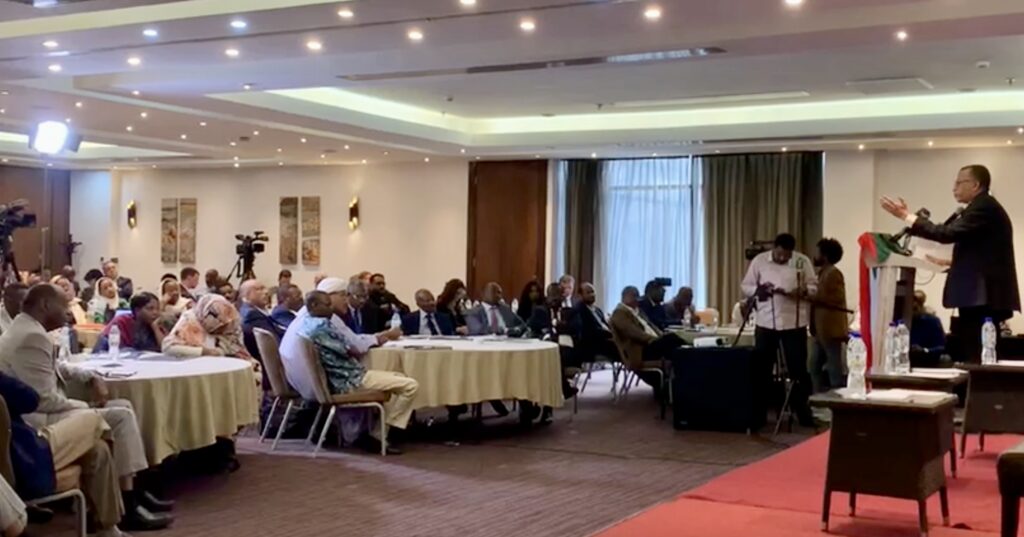 4. Civilians hold first consensus-building meeting in Addis
4. Civilians hold first consensus-building meeting in Addis
After months of effort, the first meeting of civilian forces for peace was convened in Addis in the last week of October 2023. For example, an earlier AU effort to convene civilians fell apart when a participant list that included Islamists was leaked. However, a series of preparatory meetings set the stage for the meeting in Addis.
Nearly 100 representatives of Sudanese civil society organizations, youth resistance committees, women’s groups, trade unions, and political parties, as well as local tribal and religious leaders, attended. Former Prime Minister Abdalla Hamdok opened the meeting by welcoming “the beginning of a more comprehensive process that opens the way for the participation of all national forces that oppose war and support peace and democratic civil transition.”
The session produced a final outcome statement that laid out common political positions and negotiating positions for ending the war, addressing its severe humanitarian and economic impacts, and developing coordinated media and outreach strategies. It also created a leadership structure for the “Coordination of Civil Democratic Forces” (CCDF) including a 60-person leadership body that will delegate a 30-member executive office of its members to conduct further outreach and coordinate consolidation of positions.
Specialized coordination mechanisms were also created to lead the development of more detailed negotiating positions on various issues and further workshops are planned. The meeting adopted an ambitious plan for convening a larger number of civic and political actors in two months to formally launch the CCDF.
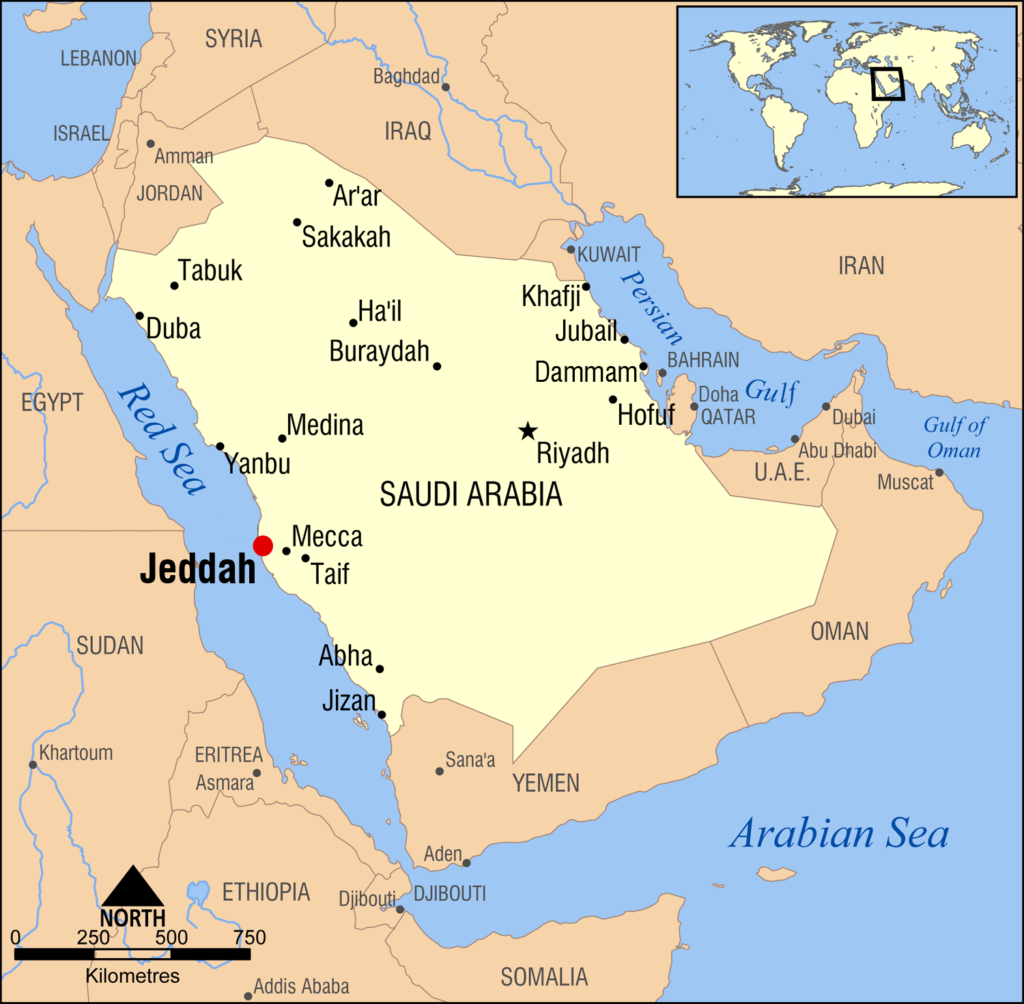 5. Restarting Jeddah
5. Restarting Jeddah
As civilians finally concluded their consultations towards unifying their ranks and adopting a joint negotiating position for the peace process, the talks seeking the belligerents’ agreement to a humanitarian ceasefire restarted in Jeddah, Saudi Arabia on October 29. The restart of negotiations is the product of intensive diplomacy. Like previous rounds, the talks will be narrowly focused on ceasefire negotiations. However, there will be a few changes to the format.
First, IGAD and the AU will be added as co-facilitators, which will help to unify international efforts. Second, the negotiations will be time-bound –allowing negotiators to step away and both assess the commitment of the parties and consult with civil society.
The hope is that the negotiations will produce more durable ceasefires and confidence-building mechanisms that will allow additional political space for a broader civilian process. However, there are already concerns as RSF has indicated that it doesn’t want to continue discussions of previous agreements. Some critics are already writing off the process as more of the same as the facilitators continue to lack leverage over the parties.
SAF has agreed to participate but has voiced conflicting positions. Since he left the besieged general headquarters of the SAF, al-Burhan has said in addressing the troops and the public his forces will fight to the last man standing. He has also said in international media appearances he was ready for a negotiated settlement. SAF has previously criticized both the AU and IGAD, but their inclusion now may be an indication that this has now been resolved.
The absence of the UN from Sudan’s multiple mediation platforms is noticeable. Khartoum expelled Volker Perthes, the SRSG to Sudan, and pressed neighboring countries to deny him access. Since the eruption of the war, the role of the UN’s Integrated Transition Assistance Mission in Sudan (UNITAMS) has been limited to the coordination of humanitarian affairs. The “Core Group” mechanism created by the AU for coordinating several mediation initiatives remains largely inactive and ineffective.
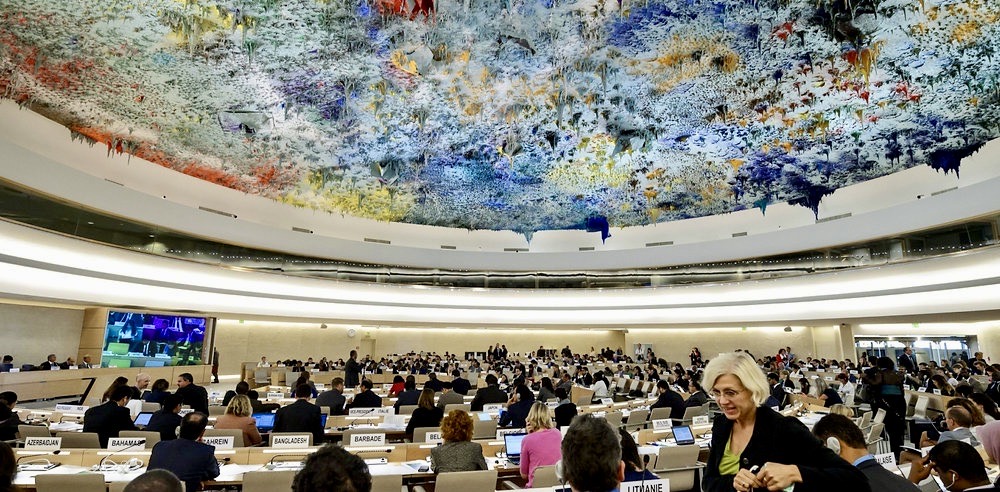 6. UN approves fact-finding mission, fails on other fronts
6. UN approves fact-finding mission, fails on other fronts
On 11 October, the UN’s Human Rights Council in Geneva adopted a resolution establishing a fact-finding mechanism (FFM) for Sudan. The resolution, tabled by the US, UK, Germany, and Norway, passed with 19 votes in favor, 16 against and 12 abstentions.
The move was a victory for advocates of justice and accountability, with its robust mandate to document and preserve evidence of human rights violations and abuses and to determine responsibility for future accountability processes. The effectiveness of the FFM will hinge on the three members the council appoints, their support staff, resources, and Sudan’s cooperation. In other contexts, FFMs may be hampered by a host country’s refusal to allow access, interference in their ability to work, and intimidation of witnesses and sources.
The move followed months of advocacy. Sudanese and international human rights organizations had long urged the HRC to establish a commission of inquiry or similar investigative mechanism. Sudan’s foreign minister called the resolution unfair and biased for appearing to equate RSF and SAF abuses and argued that the existing “designated expert” position was already sufficient. (The expert, appointed in December 2022, has the mandate to monitor, document, and report to the Council on human rights abuses but not to identify those responsible or preserve evidence in the detailed, systematic way the FFM would.) Following the vote, the Sudanese ambassador in Geneva voiced strong opposition to the resolution, calling it coercive and noting that it “put all the scope of cooperation at stake.”
The United Nations has otherwise failed to act in the face of Sudan’s spiraling war and well-documented human rights and humanitarian law violations, despite many calls for UN action including the heads of 50 human rights and humanitarian organizations who urged the UN Security Council to “pass a resolution that challenges the climate of impunity, reiterates that international law requires providing safe, unhindered humanitarian access, and redirects international efforts to better protect Sudan’s most vulnerable.”
Until progress is achieved in the talks to end the war, and with the deepening divisions that continue to paralyze the Security Council’s action on Sudan and other major crises in the world, the UN is expected to decide on a technical rollover when the UNITAMS’ mandate comes up for review in December. The Secretary-General is expected to appoint a Special Envoy to Sudan to raise the profile of UN involvement in efforts to resolve the crisis. For the moment, the Office of the Special Envoy to the Horn of Africa is spearheading the UN’s involvement.
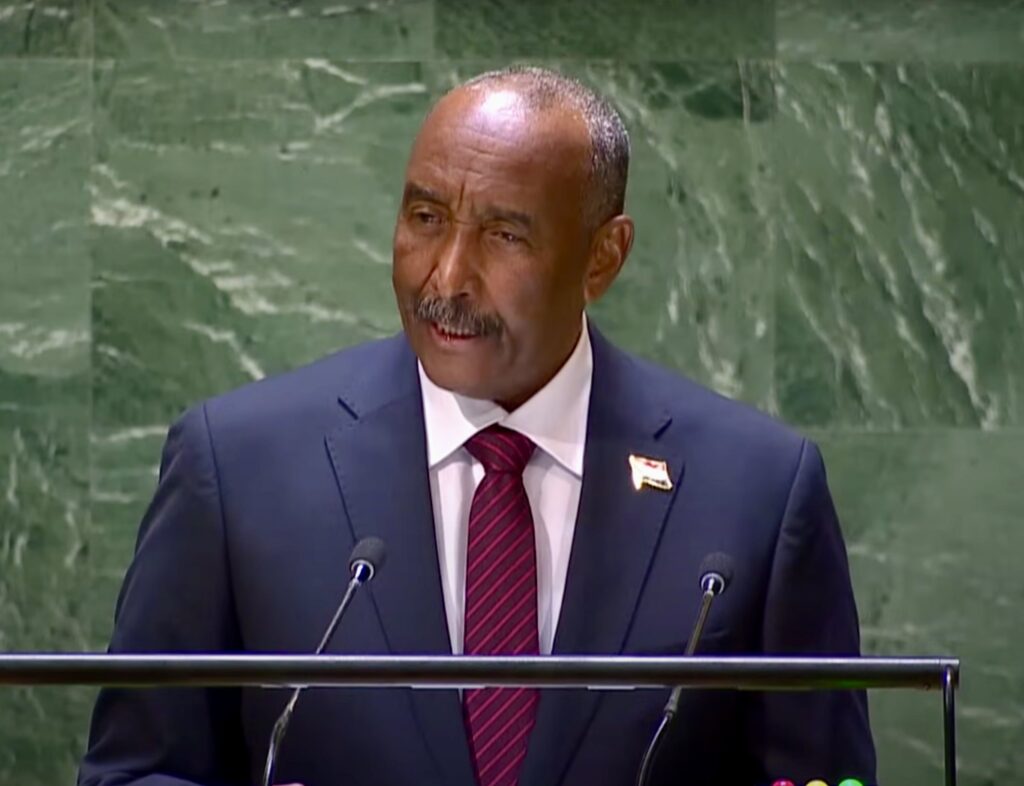 7. Sudan discussed at the UN General Assembly in New York
7. Sudan discussed at the UN General Assembly in New York
SAF leader Abdelfatah al-Burhan was in New York the week of September 18 to cap off a whirlwind international tour following his escape from army headquarters in Khartoum. Al-Burhan was able to address the UN General Assembly, as well as meet with UN Secretary-General Antonio Guterres and ICC Prosecutor Karim Khan. Leaving New York, he met Ukrainian premier Zelensky in Ireland.
The tour was a clear effort to burnish his international image. Standing before the UN General Assembly, Burhan characterized the ongoing conflict as an assault by the RSF on the SAF and the Sudanese population. He highlighted the destruction inflicted by the RSF, destroying homes and infrastructure, and accused them of recruiting other ethnic militias and releasing terrorists and ICC suspects. He called for labeling RSF terrorists and attacking their sponsors.
At the same time, other discussions on Sudan were ongoing. A high-level meeting entitled “The Cost of Inaction in Sudan: Working Together in Support of the Humanitarian Situation in Sudan and the Region” was convened by the United Nations with the Governments of Egypt, Qatar and Saudi Arabia, the European Union and the African Union.
Key humanitarian actors pointed out the severity of the war’s impact with more than 5,000 killed, 12,000 injured and five million displaced as of mid-September and 80% of health facilities not functioning. Under Secretary General for Humanitarian Affairs and Emergency Relief Coordinator, Martin Griffiths highlighted obstacles to aid, and to moving supplies from Port Sudan to Darfur. Only three convoys were reported to have made it through to Khartoum since late June.
The session mobilized some new support with the US government announcing $130 million in new assistance. However, the response remains underfunded, with only 34% of this year’s funding secured, and extensive obstacles to humanitarian access have not been resolved.
On the sidelines, an event on accountability, “Ensuring Collective Action for Securing Human Rights and Justice in Sudan” was organized by the US, Canada, Gambia, Norway, and the United Kingdom. Neimat Ahmadi, head of Darfur Women Action Group, spoke forcefully about the abuses her relatives on the ground have faced. ICC Prosecutor Karim Khan noted difficulties in gathering information and encouraged cooperation to fill in the information gaps, including by increasing connectivity to allow affected communities to report on their experiences.
The US Ambassador to the UN Linda Thomas-Greenfield reflected, “The international community has failed to hold those responsible for previous crimes to account. So, these guys think they can do it again. We’ve failed to secure justice for the people of Darfur. And that needs to change immediately.” The Canadian representative also pledged support for accountability.
A third event convened by former South African President Thabo Mbeki brought together Sudanese and international activists and analysts to discuss the way forward for Sudan. Participants reflected on the political context and the possibilities for reaching a political agreement. They noted that IGAD had shown willingness and energy to work on the crisis, but that there needed to be more cohesion among international actors working on mediation to prevent forum shopping. It was noted that a similar template was delivered to the CPA. There was also a call for greater focus on ending violence in Darfur, which is both devastating and potentially destabilizing.
More from our partner organizations:

Sign up for the Sudan Transparency and Policy Tracker newsletter here
• Sudan’s Banking System: Challenges and Opportunities October 2023
• More Aid, Solidarity, and Attention to the Sudan Crisis Needed September 2023



